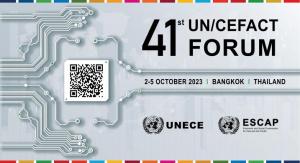
The ongoing repercussions of the COVID-19 pandemic, geopolitical instability, and elevated inflation rates continue to pose challenges to global trade, with the World Trade Organization (WTO)'s trade growth forecast now estimated at only 0.8% this year.
As the global trade landscape grapples with these challenges, the imperative remains to advance international trade and enhance the efficiency of value chains. The United Nation Centre for Trade Facilitation and Electronic Business (UN/CEFACT), with its community of 1,600 trade facilitation experts worldwide, supports this global agenda with its efforts towards achieving effective and transparent digital solutions.
Building on the achievements of the 40th UN/CEFACT Forum held in Geneva in May 2023, the over 300 trade facilitation experts from 61 countries reconvened both in-person and online at the 41st UN/CEFACT Forum from the 2 to 5 October 2023 in Bangkok, Thailand.
The Forum’s overarching theme focused on digital and green transformations as well as climate action for sustainable development, aligning with recent decisions by member States at the Commission sessions of UNECE and ESCAP. Among key areas of focus was the adoption of digital technologies to enable streamlined and efficient supply chain processes.
The joint UNECE-ESCAP conference, convening senior officials from both Regional Commissions and the United Nations Conference for Trade and Development (UNCTAD), discussed the way forward on digital and sustainable trade facilitation, presenting the findings of the fifth UN Global Survey on Digital and Sustainable Trade Facilitation and sharing forward-looking perspectives and supporting tools from partner organizations. The conference highlighted collaborative efforts among UN system, partner organizations and expert communities on strengthening the implementation of digital and sustainable trade facilitation to jointly support the growing demand from UN Member States in accelerating actions to adapt to and mitigate climate change to achieve the 2030 Agenda. Experts brainstormed about exploring viable approaches to identify sustainable and digital trade facilitation measures for climate change mitigation and adaptation.
“We are now in a multi-crisis world, seriously lagging behind in achieving the Sustainable Development Goals (SDGs). International economic cooperation, including international trade, is more important than ever in today's special economic and geopolitical context.” said Ms. Elisabeth Türk, Director of Economic Cooperation and Trade Division of UNECE. “Among other opportunities and challenges, digitalization and green transformation is really something that we can harness in terms of enhancing trade and connectivity and combating climate change.”
Policy tools and instruments developed among UN organizations and expert communities can greatly benefit UN Member States in the provision of technical assistance and capacity building, as well as strengthening the evidence-based policy making on trade facilitation for developing countries, and in particular, countries with economies in transition. Examples include the UN Global Survey on Digital and Sustainable Trade Facilitation coordinated by all UN Regional Commissions and UNCTAD, the Trade Facilitation Implementation Guide (TFIG) initiated by UNECE and partner organizations, policy recommendations and standards developed by UN/CEFACT expert community, as well as regional trade agreements and the Framework Agreement on Cross-border Paperless Trade in Asia and the Pacific, a UN treaty supported by ESCAP.
“With the acceleration of digital transformation, trade digitalization needs to be strengthened to continue lowering the barriers for more players to engage in international trade and integrate into global and regional value chains, as well as to reduce carbon emissions from the trade process.” emphasized Ms. Rupa Chanda, Director of the Trade, Investment and Innovation Division of ESCAP, in her opening remarks of the conference. “The findings of the UN Global Survey on Digital and Sustainable Trade Facilitation serve as invaluable insights that can empower countries and development partners to formulate evidence-based strategies and policies, foster the exchange of exemplary and innovative practices and pinpoint capacity building and technical assistance requirements.”
The Forum addressed critical areas such as Transport and Logistics, Finance and Payment, Travel and Tourism, Specification, and Single Window initiatives, all aimed at optimizing and modernizing trade processes, enhancing efficiency, and reducing trade barriers. The instrumental role of UN/CEFACT recommendations and solutions in supporting these efforts was underscored.
Numerous side events were held, featuring participation from partners including the Asian Development Bank, International Chamber of Commerce Digital Standards Initiative , International Trade Centre, as well as leading think tanks and academic institutions.
Looking ahead, UN/CEFACT will convene its 29th Plenary on 9-10 November and the 3rd Meeting of Team of Specialists on Environmental, Social and Governance Traceability of Sustainable Value Chains on 23rd November 2023 in Geneva.

